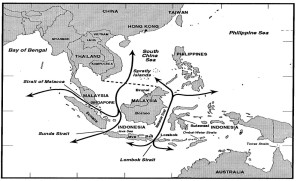Newspaper Article 07/01/2015
Southeast Asia is a progressive dynamic region. The region is well integrated economically. Region’s economic vehicle – Association of Southeast Asian Nations-ASEAN (GDP US $ 2 trillion and total trade of US $ 2.4 trillion) is progressing well. ‘ASEAN Community’ is likely by the end of 2015. ASEAN through various arrangements like Observer Status, Sectoral Dialogue Partner (SDP), Full Dialogue Partner (FDP), ASEAN Regional Forum (ARF), ASEAN+3 (China, Japan and South Korea), and Regional Comprehensive Economic Partnership-RCEP (ASEAN, China, Japan, Australia and India) carries out trade with other countries/regions. Pakistan has SDP status with ASEAN. On the strategic front, location of the three straits – Malacca, Sunda and Lombok raise the region’s stature globally. The politico-economic environment of Southeast Asia is conducive with no major irritants. However, the conflicting claims in South China Sea are being seen as a source of regional instability. China claims whole of the Sea, while the smaller ASEAN states also have claims over the resource rich Spartly and Paracel islands of the Sea.
The smaller ASEAN states wary of China’s regional ambitions, particularly, its naval muscle, support the US’s enhanced role in the region. Seen from the US’s perspective, apart from the region’s economic/strategic significance, the region’s proximity with China has raised its stature in the US policy calculus. In this backdrop, the US endeavour is to win over the confidence of regional states. US strengthening of ties with Vietnam, stepping up defence cooperation with the Philippines, Japan, South Korea, naval deployments in Singapore; reinvigorating relations with Thailand and Myanmarand bridging gaps with Indonesia are attempts to reinforce US influence in the region. US had supported the Philippines and Vietnam over the South China Sea dispute against China; “the US remained attentive to assertive Chinese behaviour that could fuel the potential for unintended conflict between China and its neighbours” (statement by James Clapper, Director of National Intelligence).
The US has also intensified its economic cooperation with the region. The US-ASEAN trade is US $ 206 billion. US other cooperative mechanisms with ASEAN include ARF, ASEAN Defence Ministers Meeting (ADMM) andExpanded Economic Engagement (E3). US has also launched the Trans-Pacific Partnership (TPP) agreement. Under the agreement, the US is negotiating with the countries – Australia, New Zealand, Peru, Chile, Canada, Mexico, Japan, Brunei Darussalam, Malaysia, Singapore, and Vietnam. TPP, having no Chinese participation, might be an attempt to dilute Chinese economic influence in the region.
China is skeptical of the American activism in the region. Chinese views the US ‘Rebalance Strategy’ as an attempt to contain China, “because only China’s rise can pose a potential challenge to US hegemony” (reference – statement of Major General Luo Yuan, a member of the Chinese People Political Consultative Conference-CPPCC and Professor Wang Fan, Chinese Foreign Affairs Institute). China views the US interference, particularly, in the South China Sea as unnecessary internationalization of the issue; China prefers to address the issue bilaterally with the respective countries. Vice Foreign Minister Cui Tiankai said that the “US is not a claimant state to the dispute, so it is better for the US to leave the dispute to be sorted out between the claimant states.” China has also adopted the Anti-Access Anti-Denial (A2D) strategy to deter the US from entering the island chain in the area of Chinese influence. The South China Sea has thus become an arena of competition and conflict.
Economically, the ASEAN economies are well integrated with that of China. China-ASEAN bilateral trade is US $ 443.61 billion (expected to reach US $ 1 trillion by 2020). Besides, China also conducts naval activities in the South China Sea, including the conduct of military exercises with Thailand, Singapore. Chinese other such moves to strengthen its regional role and downplay the US ingress include the building of oil and gas pipelines on Myanmar’s West coast (Kyaukpyu port), and port facilities at Tanjong Priok in Selat Sunda Strait, Northwest Java, Indonesia. The port will provide the shortest alternative to the Malacca Strait.
Southeast Asia’s strategic significance coupled with the region’s economic progress has not only raised the region’s stature in the comity of nations, but has also transformed the region into an arena of cooperation/or competition for regional as well as international players. China, the rising power, views the US ‘rebalancing strategy’ towards the region as a strategy to “contain China”, while the US, the established power, fears if the China’s growth continues, it could challenge the US supremacy. In this struggle, how the regional states adjust to the US-China equation, is a major challenge.
Amna Ejaz Rafi
Assistant Research Officer
Islamabad Policy Research Institute (IPRI)


